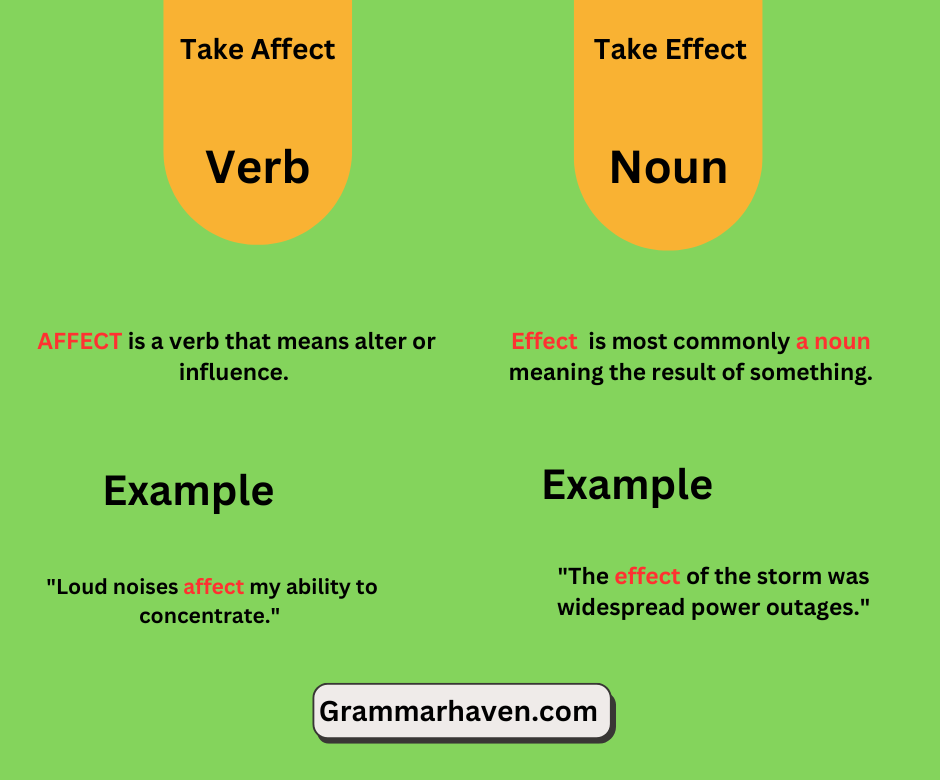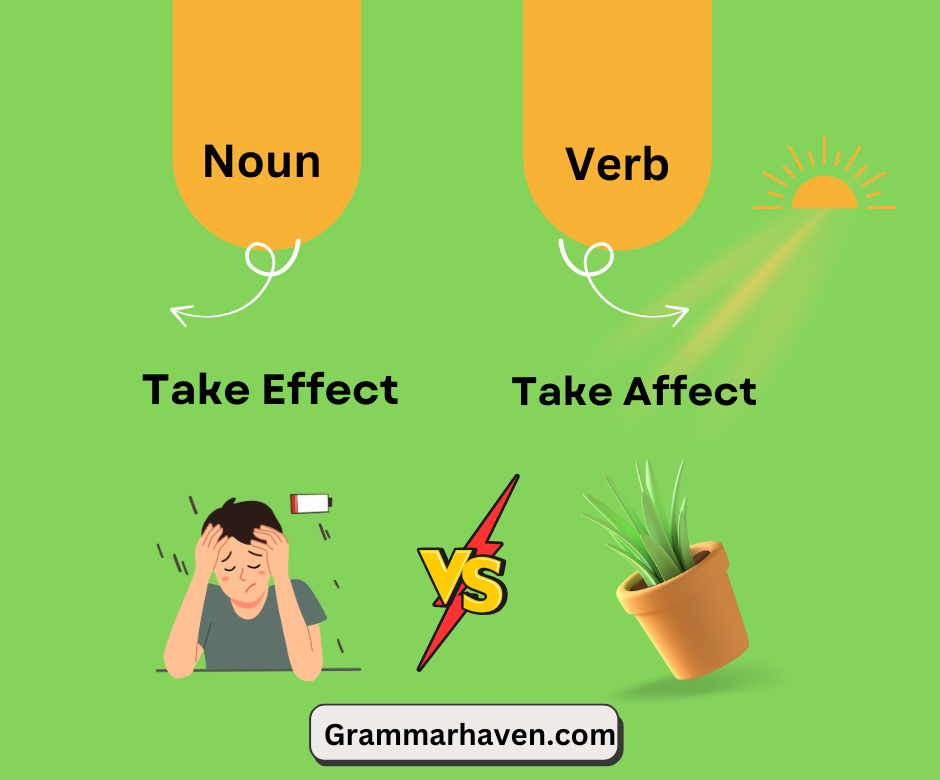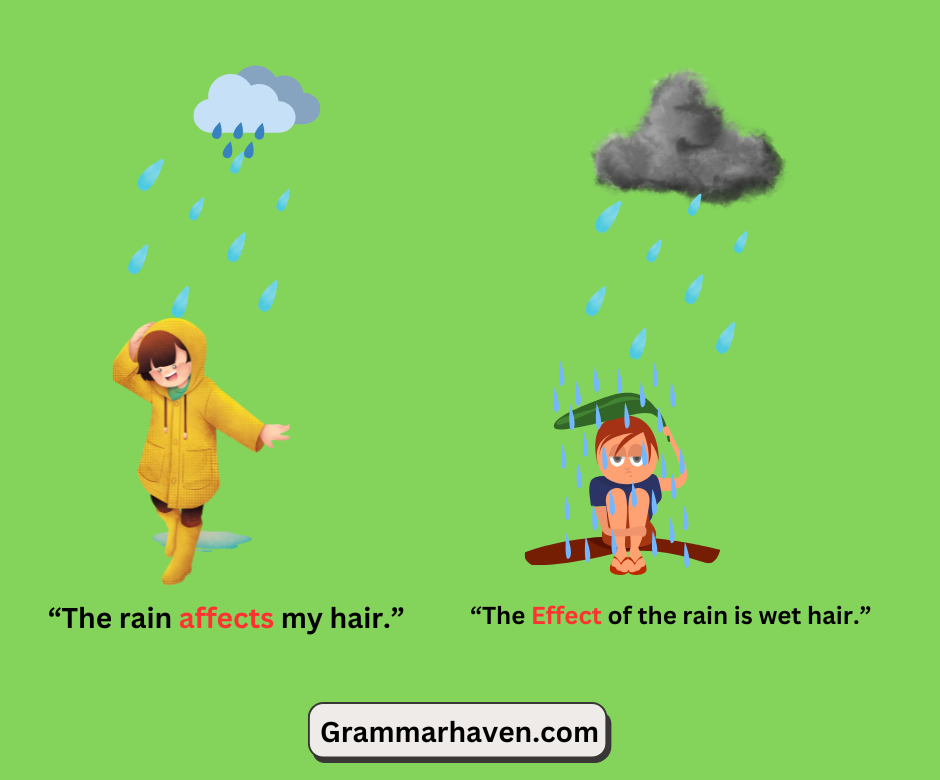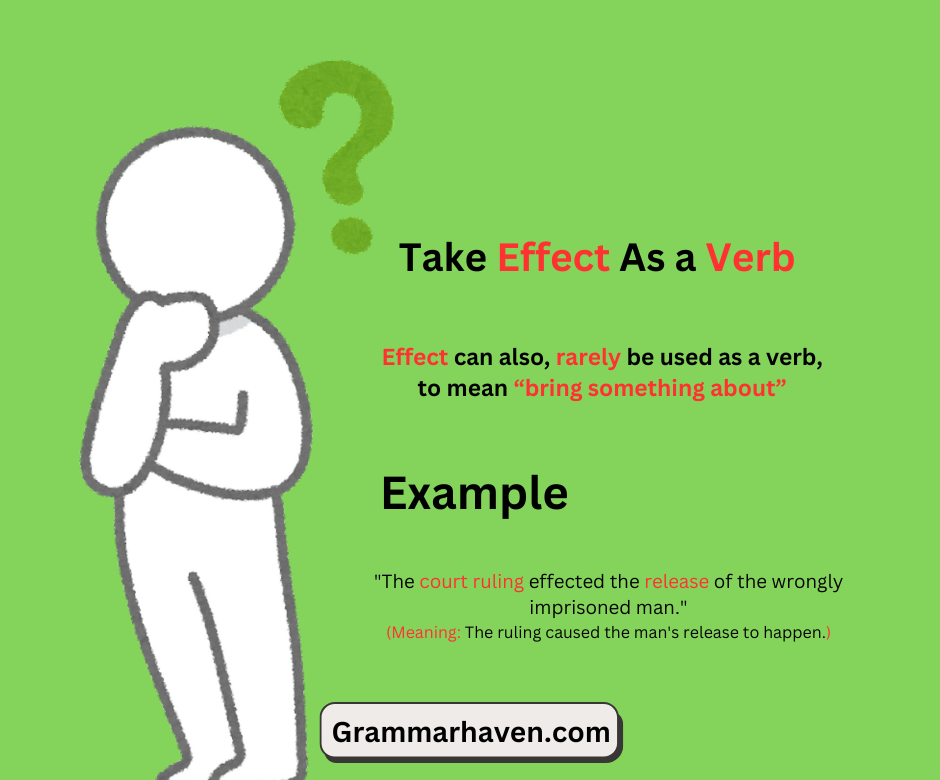Take effect vs take affect :What’s the Difference ?
The English language is full similar sounding words like take effect vs take affect that frustrates many people in writing. These phrases sound almost identical, but using the wrong one can change your entire message.
Many people get stuck in writing an important email or document and pausing to wonder which phrase is correct. Is it “the new policy will take effect tomorrow” or “take affect tomorrow”? This is just a trailer there are lots of other example that people ponder on .
By the end of this guide you will be confident enough to use take effect vs take affect in your writing and conversations correctly .
What Do “Effect” and “Affect” Mean?
To really understand the phrases take effect vs take effect, we need to first look at the individual words themselves. The confusion typically starts here, as these words not only sound similar but are related in meaning too.
Effect (Noun)
Effect is primarily used as a noun and refers to a result, outcome, or consequence of something.
For example: “The effect of the storm was widespread power outages.”
In this case, the power outages were the result (the effect) of the storm. When something “takes effect,” it means it begins to produce results or starts working.

Affect (Verb)
Affect functions mainly as a verb and means to influence, change, or have an impact on something or someone.
For example: “Loud noises affect my ability to concentrate.”
Here, the loud noises are influencing or changing something (my concentration). When something “takes affect,” it means it begins to influence emotions or behavior.
sources : Merriam-Webster ( take effect vs take affect )
The Key Distinction
The simplest way to remember the difference:
- Effect = The result or outcome (usually a noun)
- Affect = To influence or change something (usually a verb)
Common Contexts for “Take Effect”
Now that we understand the basic difference, let’s look at situations where the phrase “take effect” is commonly used. This phrase appears in many everyday contexts.
Medicine and Health
In medicine, “take effect” describes when a treatment or medication begins working in your body. There’s often a waiting period between taking medicine and feeling better – this is the time needed for the medication to “take effect“.
For example: “The pain medicine should take effect within 20 minutes, so try to rest until then.”
This timing aspect is important in healthcare. Doctors and pharmacists often explain how long it will take for medications to effect change in your symptoms.
A real example might be: After taking an antihistamine for allergies, a patient might need to wait 30-60 minutes before the medicine takes effect and provides relief from symptoms.
Laws and Policies
Government and business policies typically have specific dates when they become active or enforceable. This is when they “take effect.”
For example: “The new parking regulations will take effect on Monday, so remember to use the new permit system.”
This usage is extremely common in news reports about new legislation. You might read headlines like “Tax Cuts Take Effect Next Month” or “Safety Regulations to Take Effect in January.”
| Policy Type | Description | Date to Take Effect |
| Speed Limit Reduction | 35 mph limit on Main Street | April 15, 2025 |
| New Healthcare Rules | Updated insurance requirements | January 1, 2025 |
| School Dress Code | Modified uniform policy | September 5, 2025 |

Natural Processes
Environmental and natural changes also “take effect” when they begin to produce noticeable results.
For example: “The conservation efforts have started to take effect, with more wildlife returning to the area.”
Weather forecasters might say: “The cooling trend will take effect overnight, bringing temperatures down by morning.”
Common Contexts for “Take Affect”
While “take effect” is quite common, “take affect” appears less frequently but has specific uses related to emotional or psychological influence.
Emotional or Psychological Impact
The phrase “take affect” can describe how something begins to influence someone’s emotional state.
For example: “The sad news seemed to take affect immediately, as tears welled up in her eyes.”
In this usage, we’re talking about the news beginning to influence or change someone’s emotions.
A real-world example might be how a moving speech can take affect on an audience, gradually shifting their mood from indifferent to inspired or motivated.

Behavioral Changes
When emotions lead to changes in how someone acts, we might say those emotions “took affect” on their behavior.
For example: “His anxiety took affect on his performance during the interview.”
This describes how the feeling of anxiety began to influence or change his interview performance.
Use in Psychological Studies
In psychology research, researchers might observe how certain stimuli “take affect” on participants.
For example: “The researchers noted how quickly the stressful environment took affect on the participants’ decision-making abilities.”
This usage emphasizes the process of emotional or psychological influence beginning to cause changes in behavior or cognitive processes.
How to Remember the Difference Between “Take Effect” vs “Take Affect”
If you’re still unsure about which phrase to use, here are some helpful memory tricks.
Mnemonic Devices
Here are simple ways to keep these terms straight:
- Think “Effect = End result” – Effects are outcomes or results that happen at the end of a process.
- Think “Affect = Action on emotions” – Affect is about actively influencing feelings or behaviors.
- “RAVEN” – Remember Affect is a Verb, Effect is a Noun.
When you’re trying to decide between “takes affect or takes effect“, ask yourself: “Am I talking about something starting to work or produce results (effect), or am I talking about something beginning to influence emotions (affect)?”
Grammar Tip: Noun vs. Verb
The most reliable way to choose between “take effect or take affect” is to determine if you need a noun or a verb:
- If you’re talking about a result beginning to happen, use “take effect” (noun usage)
- If you’re describing emotional influence beginning to happen, use “take affect” (verb usage)
In most everyday writing, “take effect” is far more common than “take affect“.
Example Sentences
Practice identifying the correct usage with these examples:
- The new company policy will ________ next month.
- The motivational speech began to ________ on the team’s morale.
- These changes won’t ________ until after the holidays.
- The tragic news quickly ________ on everyone present.
- The medication should ________ within an hour.
Answers:
- take effect (the policy starts working)
- take affect (influencing emotions/morale)
- take effect (changes start happening)
- took affect (emotional influence)
- take effect (medication starts working)
Common Mistakes and How to Avoid Them
Even professional writers sometimes mix up “is it take affect or take effect.” Here are some common errors and how to fix them.

List of Common Errors:
- Incorrect: “The new law will take affect on January 1st.” Correct: “The new law will take effect on January 1st.”
- Incorrect: “The medication took affect after about 30 minutes.” Correct: “The medication took effect after about 30 minutes.”
- Incorrect: “Her words took effect on my feelings immediately.” Correct: “Her words took affect on my feelings immediately.”
- Incorrect: “When will these changes take affect?” Correct: “When will these changes take effect?”
Quick Tips for Proofreading:
- Replace the phrase with “produce results” or “start working” – if it makes sense, use “take effect“
- Replace with “influence emotions” – if it fits, use “take affect“
- When in doubt, remember that “take effect” is much more commonly used in everyday writing
If you’re referring to laws, rules, medications, or policies starting to work, you almost certainly want “take effect“.
Conclusion
Mastering the difference between “take effect vs take affect” comes down to understanding whether you’re talking about results beginning (effect) or emotional influence starting (affect). Most of the time in everyday writing, “take effect” is what you’ll need.
The tips and tricks explained in this guide, will definitely make you able to use these phrases correctly and confidently in your writing and conversations. Just remember: effects are results, and affects are influences – and you’ll rarely go wrong.
FAQs
Can “affect” ever be used as a noun?
Yes! Psychologists use “affect” as a noun when discussing someone’s emotional state or expression.
Is “take affect” a common phrase?
Not really. People often confuse it with “take effect,” which is the correct and much more common phrase.
Can “effect” be a verb?
yes rarely effect can act as a verb ,When you “effect change,” you’re bringing something new into existence through your actions.
Example ““The scientist’s research effected a breakthrough in cancer treatment.”
(Meaning: The research brought about an important discovery.)
What’s a good way to remember “effect” vs. “affect”?
Affect is the Action (both start with A), while Effect is the End result (both start with E).
Why do people often confuse these words?
They sound nearly identical when spoken and their meanings overlap in ways that trip up even careful writers.






